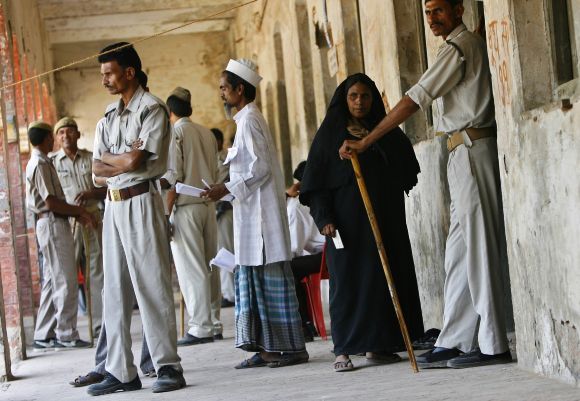 While critics say that there’s no ‘Modi wave’ in four Muslim-dominated parliamentary constituencies in Bihar’s Seemanchal belt, but Bharatiya Janata Party leaders are hopeful to retain three out of the four seats here. In 2009 general elections, the BJP won in Purnea, Katihar and Araria but lost in Kishanganj. However, that was in alliance with the Janata Dal-United.
While critics say that there’s no ‘Modi wave’ in four Muslim-dominated parliamentary constituencies in Bihar’s Seemanchal belt, but Bharatiya Janata Party leaders are hopeful to retain three out of the four seats here. In 2009 general elections, the BJP won in Purnea, Katihar and Araria but lost in Kishanganj. However, that was in alliance with the Janata Dal-United.
The party’s hope lies in the sharp division of Muslim votes in the region, coupled with the split of anti-BJP votes and the polarisation of Hindus in its favour.
Like in many other parts of the country, Muslims in the Seemanchal region have strong reservations against BJP’s prime ministerial candidate Narendra Modi. It appears that they have decided to support a candidate who can defeat the BJP in the polls.
But the ground situation is different. Muslims are divided between ‘secular’ Rashtriya Janata Dal-Congress combine, the ruling Janata Dal-United, the Aam Aadmi Party and Samajwadi Party candidates.
The region will go to polls on Thursday.
The BJP candidates and the sitting MPs, who are seeking re-election from Katihar, Purnea and Araria, are eyeing the Muslim votes this time as division of their votes have helped them in the past.
“Though caste arithmetic has been played by political parties and their candidates in fray are consolidating their social base, the BJP is keener for division of Muslim voters,” says Ranjeev, a political watcher.
The Seemanchal region -- one of the most backward pockets in the state -- shares its borders with Nepal, Bangladesh and West Bengal, and has a sizeable Muslim population -- from 30 per cent in Purnea to nearly 70 per cent in Kishanganj.
Three other constituencies -- Supaul in the flood-prone Kosi region and Bhagalpur and Banka also have a sizeable Muslim population that will influence the outcome of polls.
The Congress’ Ashrarul Haque won in Kishanganj in 2009. He is seeking a re-election this time.
Historically Kishanganj has mostly voted either for Congress or parties backed by it. Even at the peak of anti-incumbency and pro-VP Singh-led Janata Dal wave in 1989, Congress’ M J Akbar, the senior journalist who was fielded by Rajiv Gandhi, managed to bag the seat.
However, the BJP managed to wrest the seat in 1999 when Shahnawaz Hussain defeated RJD’s Mohammed Taslimuddin. But in 2009, Taslimudin defeated Shahnawaz and forced the latter to shift to the Bhagalpur constituency.
Shahnawaz, the former Union minister, is seeking a re-election this time around in Bhagalpur which too has a considerable 3 lakh Muslim voters.
But unlike Kishanganj, Muslims cannot decide the fate of the candidates in Bhagalpur.
Shahnwaz won the seat for the first time in the 2006 by-polls followed by 2009, thanks to overwhelming support of upper castes, backward castes and Mahadalits due to Chief Minister Nitish Kumar, whose party Janata Dal-United was in alliance with the BJP then.
But the situation has changed now. Shahnawaz is fighting a tough battle and the BJP camp is not sure of the poll outcome despite their tall claims of a ‘Modi wave’.
Now take for instance the Katihar seat where Muslims constitute 44 per cent of the total votes. The BJP candidate and sitting MP Nikhil Chaudhary is again hopeful of division of Muslim votes and other anti-BJP votes to make it through.
Nationalist Congress Party’s Tariq Anwar, the lone Union minister from Bihar in the Congress-led United Progressive Alliance government, will challenge Chaudhary in Katihar.
Anwar is confident of winning the seat this time around and feels that the alliance with Congress and RJD will help him.
The constituency of Araria, with a 41 per cent Muslim population, is represented by BJP’s Pradeep Kumar Singh in Parliament. In 2009, the division of Muslim votes and also multiple Muslim candidates have helped the BJP to bag the seat.
Although Muslims constitute about 30 per cent of the total population in Purnea, the BJP won the seat in 2009 without their support. BJP’s sitting MP Udai Singh is confident that he’ll win the seat this time around as well.










